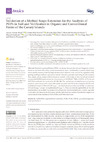Identificador persistente para citar o vincular este elemento:
https://accedacris.ulpgc.es/jspui/handle/10553/107290
| Título: | Validation of a method scope extension for the analysis of POPs in soil and verification in organic and conventional farms of the Canary Islands | Autores/as: | Acosta Dacal, Andrea Carolina Rial Berriel, Cristian Javier Díaz Diaz, Ricardo Bernal Suárez, María Del Mar Zumbado Peña, Manuel Luis Henríquez Hernández, Luis Alberto Alonso González, Pablo Parga Dans, Eva Pérez Luzardo, Octavio Luis |
Clasificación UNESCO: | 251106 Conservación de suelos 3104 Producción Animal 330807 Eliminación de residuos |
Palabras clave: | Gas Chromatography– Mass Spectrometry Organochlorine Pesticides PAHs PBDEs PCBs, et al. |
Fecha de publicación: | 2021 | Publicación seriada: | Toxics | Resumen: | Persistent organic pollutants (POPs) are among the most relevant and dangerous contaminants in soil, from where they can be transferred to crops. Additionally, livestock animals may inadvertently consume relatively high amounts of soil attached to the roots of the vegetables while grazing, leading to indirect exposure to humans. Therefore, periodic monitoring of soils is crucial; thus, simple, robust, and powerful methods are needed. In this study, we have tested and validated an easy QuEChERS-based method for the extraction of 49 POPs (8 PBDEs, 12 OCPs, 11 PAHs, and 18 PCBs) in soils and their analysis by GC-MS/MS. The method was validated in terms of linearity, precision, and accuracy, and a matrix effect study was performed. The limits of detection (LOD) were established between 0.048 and 3.125 ng g−1 and the limits of quantification (LOQ) were between 0.5 and 20 ng g−1, except for naphthalene (50 ng g−1 ). Then, to verify the applicability of the validated method, we applied it to a series of 81 soil samples from farms dedicated to mixed vegetable cultivation and vineyards in the Canary Islands, both from two modes of production (organic vs. conventional) where residues of OCPs, PCBs, and PAHs were found. | URI: | https://accedacris.ulpgc.es/handle/10553/107290 | ISSN: | 2305-6304 | DOI: | 10.3390/toxics9050101 | Fuente: | Toxics [EISSN 2305-6304], v. 9 (5), 101, (Enero 2021) |
| Colección: | Artículos |
Citas SCOPUSTM
12
actualizado el 08-jun-2025
Citas de WEB OF SCIENCETM
Citations
11
actualizado el 12-ene-2026
Visitas 10
91
actualizado el 10-ene-2026
Descargas
59
actualizado el 10-ene-2026
Google ScholarTM
Verifica
Altmetric
Comparte
Exporta metadatos
Los elementos en ULPGC accedaCRIS están protegidos por derechos de autor con todos los derechos reservados, a menos que se indique lo contrario.
